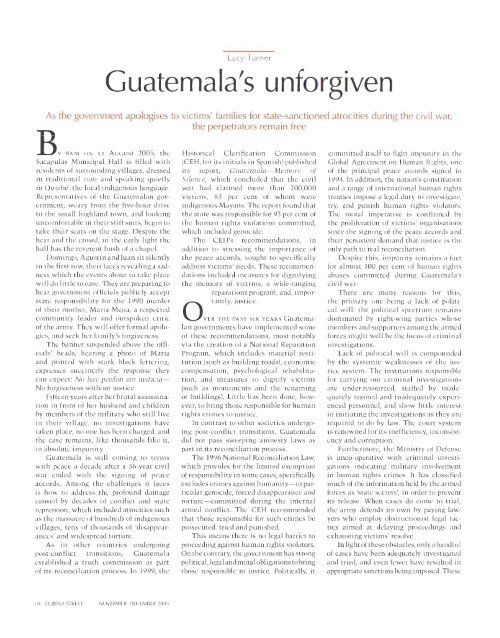0 - Eureka Street
0 - Eureka Street
0 - Eureka Street
Create successful ePaper yourself
Turn your PDF publications into a flip-book with our unique Google optimized e-Paper software.
Lucy Turner<br />
Guatemala's unforgiven<br />
As the government apologises to victims' families for state-sanctioned atrocities during the civil war,<br />
the perpetrators remain free<br />
BY BAM oN a<br />
AuGu" 2005, the<br />
Sacapulas Municipal Hall is filled with<br />
residents of surrounding villages, dressed<br />
in traditional traje and speaking quietly<br />
in Qu iche, the local indigenous language.<br />
Representatives of the Guatemalan government,<br />
weary from the five- hour drive<br />
to the sma ll highland town, and looking<br />
uncomfortable in their stiff suits, begin to<br />
take their seats on the stage. Despite the<br />
heat and the crowd, in the early light the<br />
hall has the reverent hush of a chapel.<br />
Domingo, Agustin and Ju an sit silently<br />
in the first row, their faces revealing a sadness<br />
which the events about to take place<br />
will do little to ease. They are preparing to<br />
hear government officials publicly accept<br />
state responsibility for the 1990 murder<br />
of their m other, Maria Mejia, a respected<br />
community leader and outspoken critic<br />
of the arm y. They will offer formal apologies,<br />
and seek her family's forgiveness.<br />
The banner su spended above the officials'<br />
heads, bearing a photo of Maria<br />
and printed with stark black lettering,<br />
expresses succinctly the response they<br />
can expect: No hay perd6n sin justicia<br />
No forgiveness without justice.<br />
Fifteen years after her brut a 1 assassination<br />
in front of her husband and children<br />
by members of the military who still live<br />
in their village, no investiga tions have<br />
taken place, no one has been charged, and<br />
the case remains, like thousands like it,<br />
in absolute impunity.<br />
Guatemala is still coming to terms<br />
with peace a decade after a 36-year civil<br />
war ended with the signing of peace<br />
accords. Among the challenges it faces<br />
is how to address the profound dam age<br />
caused by decades of conflict and state<br />
repression, which included atrocities such<br />
as the massacre of hundreds of indigenous<br />
villages, tens of thousands of 'disappearances'<br />
and widespread torture.<br />
As in other countries undergoing<br />
post-conflict transitions, Guatemala<br />
established a truth commission as part<br />
of its reconciliation process. In 1999, the<br />
H istorical Clarification Commission<br />
(CEH, for its initials in Spanish) published<br />
its report, Guatemala-Memory of<br />
Silence, which concluded that the civil<br />
war had claimed more than 200,000<br />
victims, 83 per cent of whom were<br />
indigenous Mayans. The report found that<br />
the state was responsible for 93 per cent of<br />
the human rights violations committed,<br />
which included genocide.<br />
The CEH 's recommendations, in<br />
addition to stressing the importance of<br />
the peace accords, sought to specifically<br />
address victims' needs. These recommendations<br />
included m easures for dignifying<br />
the memory of victims, a wide-rangi ng<br />
reparations program, and, importantly,<br />
justice.<br />
0<br />
VER THE PAST S I X YEARS Guatemalan<br />
governments have implemented some<br />
of these recommendations, most notably<br />
via the creation of a N ational Reparation<br />
Program, which includes material restitution<br />
(such as building roads), economic<br />
compensation, psychological rehabilitation,<br />
and measures to dignify victim s<br />
(such as monuments and the renaming<br />
of buildings). Little has been done, however,<br />
to bring those responsible for human<br />
rights crimes to justice.<br />
In contrast to other societies undergoing<br />
post-conflict tran sitions, Guatemala<br />
did not pass sweeping amnesty laws as<br />
part of its reconciliation process.<br />
The 1996 National Reconciliation Law,<br />
which provides for the limited exemption<br />
of responsibility in some cases, specifically<br />
excludes crimes against humanity-in particular<br />
genocide, forced disappearance and<br />
torture-committed during the internal<br />
armed conflict. The CEH recommended<br />
that those responsible for such crimes be<br />
prosecuted, tried and punished.<br />
This means there is no legal barrier to<br />
proceeding against human rights violators.<br />
On the contrary, the government has strong<br />
political,lega land moral obligations to bring<br />
those responsible to justice. Politically, it<br />
committed itself to fight impunity in the<br />
Global Agreement on Human Rights, one<br />
of the principal peace accords signed in<br />
1994. In addition, the nation's constitution<br />
and a range of international human rights<br />
treaties impose a legal duty to investigate,<br />
try, and punish human rights violators.<br />
The moral imperative is confirmed by<br />
the proliferation of victims' organisations<br />
since the signing of the peace accords and<br />
their persistent demand that justice is the<br />
only path to real reconciliation.<br />
Despite this, impun ity remains a fact<br />
for almost 100 per cent of human rights<br />
abuses committed during Guatemala's<br />
civil war.<br />
There are many reasons for this,<br />
the primary one being a lack of political<br />
will: the political spectrum remain s<br />
dominated by right-wing parties whose<br />
m embers and supporters among the armed<br />
forces m ight well be the focus of criminal<br />
investiga tions.<br />
Lack of political will is compounded<br />
by the systemic weaknesses of the justice<br />
system. The institutions responsible<br />
for carrying out criminal investigations<br />
arc under-resourced, staffed by inadequately<br />
trained and inadequately experienced<br />
personnel, and show little interest<br />
in initiating the investigations as they are<br />
required to do by law. The court system<br />
is renowned for its inefficiency, inconsistency<br />
a nd corruption.<br />
Furthermore, the Ministry of Defense<br />
is unco-operative with criminal investigations<br />
indicating military involvement<br />
in human rights crimes. It has classified<br />
much of the information held by the armed<br />
forces as 'state secrets', in order to prevent<br />
its release. When cases do come to trial,<br />
the army defends its own by paying lawyers<br />
who employ obstructionist legal tactics<br />
aimed at delaying proceedings and<br />
exhausting victims' resolve.<br />
In light of these obstacles, only a handful<br />
of cases have been adequately investigated<br />
and tried, and even fewer have resulted in<br />
appropriate sanctions being imposed. These<br />
18 EUREKA STREET NOVEMBER- DECEMBER 2005
















